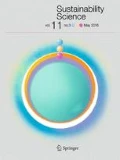Abstract
The Industrial Revolution and associated economic, demographic, technological and cultural changes have resulted in what many scientists are beginning to refer to as “the Anthropocene” – roughly translated, the Age of Humans. One response to this development is the nascent field of “sustainability science,” a multidisciplinary and systemic attempt to perceive and understand this new era. In doing so, however, methodologies and intellectual frameworks must be developed which extend beyond existing, dominantly reductionist, approaches, and are intended to address emergent characteristics of complex systems that integrate cultural and social systems, the engineered and built environment and natural systems. In the area of ethics, this requires developing a capability for “macroethics,” or ethical systems and processes capable of addressing issues arising from the emergent behavior of the complicated systems that characterize the Anthropocene.
Similar content being viewed by others
References
Allenby BR (2005a) Reconstructing the earth. Island Press, Washington D.C.
Allenby BR (2005b) Micro and macro ethics for an anthropogenic Earth. American Association for the Advancement of Science (AAAS) professional ethics report vol 18. AAAS Washington D.C., pp 1–5
Allenby BR (2006) The ontologies of industrial ecology. Progr Indust Ecol 3(1/2):28–40
Barabasi A (2002) Linked: the new science of networks. Perseus Publ, Cambridge
Bijker WE, Hughes TP, Pinch T (eds) (1997) The social construction of technological systems. MIT, Cambridge
Castells M (2000) The rise of the network society, 2nd edn. Blackwell, Oxford
Cronon W (ed) (1995) Uncommon ground: rethinking the human place in nature. W. W. Norton and Company, New York
Devon R (2004) Towards a social ethics of technology: a research prospect. Techne 8:99–115
Fleddermann CB (1999) Engineering ethics. Prentice-Hall, Upper Saddle River
Garreau J (2004) Radical evolution. Doubleday, New York
Grubler A (1998) Technology and global change. Cambridge University Press, Cambridge
Harvey D (1996) Justice, nature and the geography of difference. Blackwell, Oxford
Hughes TP (2004) Human-built world: how to think about technology and culture. University of Chicago Press, Chicago
Johnson M (1997) Moral imagination: implications of cognitive science for ethics. University of Chicago Press, Chicago
Mathews JT (1997) Power shift. Foreign Aff 76:50–66
McNeill JR (2000) Something new under the sun. W.W. Norton and Co., New York
NAE (National Academy of Engineering) (2004) Emerging technologies and ethical issues in engineering. National Academy Press, Washington
Nature editorial (2003) Welcome to the Anthropocene. Nature 424:709
Senge PM (1990) The fifth discipline. Doubleday, New York
WECD (the World Commission on Environment, Development, also known as the Brundtland Commission) (1987) Our common future. Oxford University Press, Oxford
Author information
Authors and Affiliations
Corresponding author
Rights and permissions
About this article
Cite this article
Allenby, B. Macroethical systems and sustainability science. Sustain Sci 1, 7–13 (2006). https://doi.org/10.1007/s11625-006-0003-8
Received:
Accepted:
Published:
Issue Date:
DOI: https://doi.org/10.1007/s11625-006-0003-8



